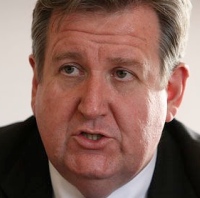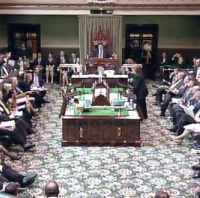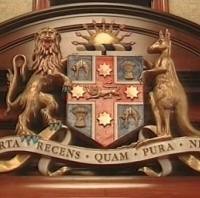- About Us
- Columns
- Letters
- Cartoons
- The Udder Limits
- Archives
- Ezy Reading Archive
- 2024 Cud Archives
- 2023 Cud Archives
- 2022 Cud Archives
- 2021 Cud Archives
- 2020 Cud Archives
- 2015-2019
- 2010-2014
- 2004-2009
 |
Micro parties and the politics of maturity in New South Wales |
Occasionally, outside observers might be confused about who actually governs in the state of New South Wales. Aspects of government machinery make it possible for significant political power to be exercised by small minority groups. It is important to appreciate that the electoral systems used in the two houses of parliament differ markedly. While lower house elections generally produce a majority party government, the upper house is more diverse. The values of democracy are served by the balance between the two chambers. The seemingly disproportionate influence wielded opportunistically by some minorities may seem a high price to pay but it is usually an affordable political cost.
The lower house or Legislative Assembly has always been regarded as the place where democracy is guaranteed. It is the directly elected chamber and according to the Westminster tradition, the place where government is formed, money bills introduced and the will of the people expressed. Currently 93 MLAs are elected each four years in single member geographical constituencies, each containing approximately the same number of electors. In this, the 55th Parliament elected in 2011, sit 69 Coalition (Liberal and National Party) MLAs, 20 Labor, 3 Independents and 1 from the Greens. The Coalition Government led by Premier Barry O’Farrell has a strong majority and a clear mandate to implement the policies it took to the people during the 2011 campaign. The specifics of the mandate will always be debated in theory and contested politically.
The upper house or Legislative Council evolved from a nominated body that advised autocratic governors in the nineteenth century. Its members now serve full-time and are elected on universal suffrage. In the Westminster tradition, certain conventions inherited from the House of Lords constrain the operations of the Legislative Council. Australian upper houses have always been mindful of the need to avoid frustrating governments democratically elected in lower houses. They have built themselves roles as serious houses of legislative review, but have generally been modest in taking initiatives.
Australian upper houses are generally elected using some system of proportional representation. These systems are designed to ensure that a party’s return of Members reflects the party’s support at the ballot box. In the Assembly, the necessity of gaining a majority means that in theory, a party could secure up to 49% support but if its support were dispersed across all electorates, it could fail to win a seat. In the Council, seats should reflect voting support. This effect is somewhat confused by the fact that only half of the MLCs (21 of 42) are elected each four years. This can cause partial disjunction between the will of the people and the Council composition, but it helps guard against violent swings of sentiment.
As the Government party is unlikely to have an upper house majority, crossbenchers find themselves with a ‘balance of power’. Improved legislation results when minor parties exercise this power responsibly. The government needs to know that when minor parties propose amendments to bills, they are being sincere and not cynically obstructive. Minor parties can adopt one of two approaches to their power. The first is to treat every bill on its merits, to debate earnestly and to vote only for those laws which they believe will advance the community good. The second is to engage in trade-offs by voting for government bills in exchange for concessions in areas of interest to minor party voters. This latter approach can damage the public reputation of both the minor parties and the Government.
In the current Council, the Coalition parties have 19 MLCs, Labor 14, Greens 5, Christian Democratic Party (Fred Nile Group) 2 and Shooters and Fishers 2. In the past, there have been MLCs of the Australian Democrats, Unity Party, A Better Future for Our Children and Reform the Legal System. Theories of ‘partial adjustment’ suggest that the rise and fall of minor parties reflects the prominence of issues that are neglected by the major parties. Cynics might prefer the explanation that minor or micro party candidates foster community fears and exploit a generous electoral system.
The Greens, the Christian Democrats and Shooters and Fishers have little common ground. If they vote together – either for or against Bills - it is likely that their position has merit. Often, the Ministers with responsibility for a Bill will accept amendments when the arguments are strong. After all, the Government wants the legislation passed eventually, so is usually willing to compromise on some points to remove minor party objections. 
Occasionally, minor party MLCs will abstain from a vote on the grounds that their mandate does not extend into all areas. This raises the question of the purpose of being an MP. According to one theory, MPs are just delegates for the voters. Most members argue however, that their role resembles that of the ‘trustee’. They try to represent their constituents but sometimes must exercise their own judgment conscientiously. MLCs are elected across the state. So, without a specific seat to represent, they formulate a state wide constituency based on issues.
The Shooters Party attracts attention occasionally with ideas such as ensuring that shooting is included in the school curriculum. Recently a suggestion by the Game Council has again raised the prospect of the Shooters Party power in the Legislative Council. If the proposal became government policy, then teenagers would be allowed to hunt feral animals in state forests using weapons such as knives. The proposal includes parental responsibility to the extent that the state would be indemnified against any damages arising from teen behaviour. This seems like a recipe for disaster and a step towards a litigious society.
Their ideological enemies assert that the Game Council is a Shooters Party front. When the Game Council makes a proposal there is an implication that the Shooters Party will use its potential balance of power to ensure that the proposal receives government support. The Greens have noticed that since its establishment in 2002, the NSW Game Council has had some $11 million in public funds, despite promises that it would be self-funding. The Greens have also noted that the Shooters Party has been tardy in supplying details of donations to it by sporting groups. The Game Council notes its success in establishing local ‘Conservation Hunting Groups’. The implication is that the Game Council might use public money to fund hunting groups, which then make donations towards Shooters Party finances. 
Critics of the Game Council have argued that it is not sincere in its claims that it does important work in eradicating feral animals. Rather they say, hunters have a vested interest in ensuring that feral animal populations remain high. When this latest proposal was aired, a report from a high school in the state’s Central Tablelands placed the idea into unfortunate perspective. A kangaroo had been cornered in the agriculture block and savagely mauled by persons unknown. The police were called to put the animal down. Children can be cruel. They can also have trouble distinguishing between species. Despite Game Council assurances that their proposal really only guarantees freedoms which country children have always enjoyed, it is clear that most children do not need to have such freedoms.
A mature attitude to the responsibilities of representation requires MLCs to treat every Bill on its merits. A mature attitude to the growth of children would see adults encouraging children to engage with animals through volunteer work with an organisation such as WIRES (Wildlife Information and Rescue Service). Parliamentarians of the Shooters and Fishers Party should exercise their wider responsibilities rather than pander to any niche constituency with bizarre views.
